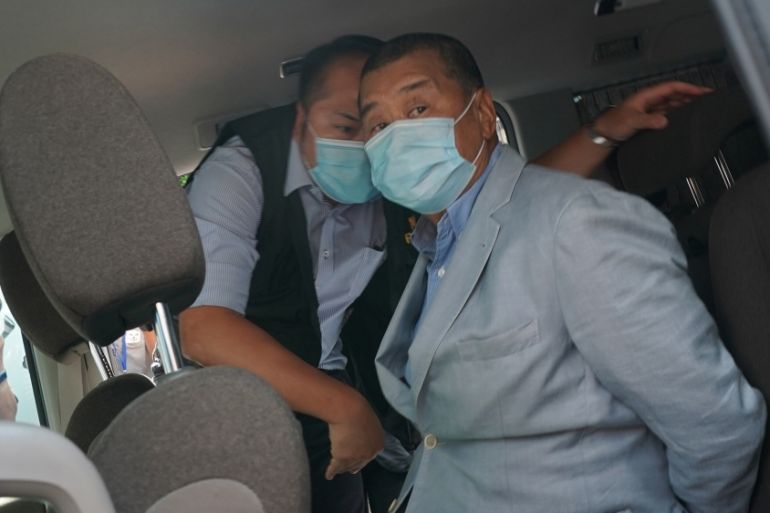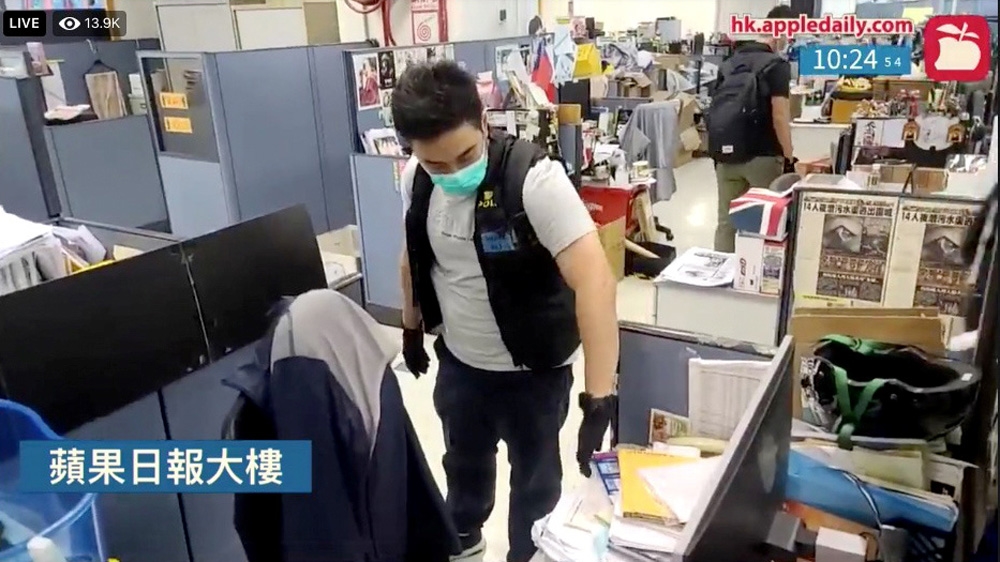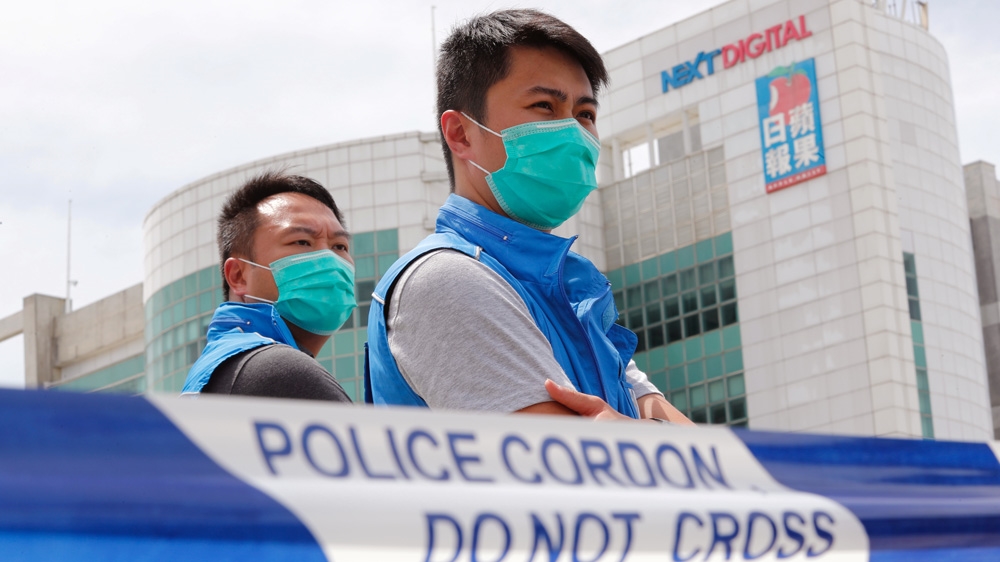Hong Kong media tycoon arrested, newspaper raided
Jimmy Lai accused of ‘colluding with foreign powers’ in most high-profile arrest yet under new security law.

Media tycoon Jimmy Lai has been arrested under Hong Kong’s national security legislation, and his newspaper raided, as he was accused of “colluding with foreign powers” in the most prominent arrest since China imposed the controversial law just over a month ago.
Lai’s Apple Daily reported that 10 police officers arrived at the 72-year-old’s home at about 7am (23:00 GMT on Sunday), and later began livestreaming a raid on its headquarters by scores of police who could be seen looking through piles of papers including on reporters’ desks.
Keep reading
list of 4 itemsGeorgia advances ‘foreign agents’ bill as 20,000 rally against it
NPR editor resigns after accusing US outlet of liberal bias
Lawmakers brawl as Georgian Parliament considers ‘foreign agent’ bill
Mark Simon, a senior executive at Lai’s Next Media group, said on Twitter that the tycoon was “being arrested for collusion with foreign powers at this time”.
The police confirmed the arrest of seven people aged between 39 and 72.
“Offences include collusion with a foreign country/external elements to endanger national security, Article 29 of the NSL.. Investigation is underway,” the force posted on its official Twitter account. Article 29 relates to alleged offences, including receiving any kind of support – directly or indirectly – from people overseas, and carries a maximum sentence of life imprisonment.
Lai’s is the most high-profile arrest since China imposed the security legislation, triggering condemnation from activists within Hong Kong as well as from Western countries who feared the law would be used to crack down on critics and stifle reporting.
Police now at Apple Daily building. Executing Search Warrent on 2nd floor, Newsroom floor.
— Mark Simon (@HKMarkSimon) August 10, 2020
Police officer flipping through materials on the desk of a senior editor in @appledaily_hk HQs. When chief editor Law Wai-kwong asked where the search warrant is and what they are looking for, an officer asked him to "ask someone more senior, I am only executing the order". pic.twitter.com/sH0NQXeamO
— Xinqi Su 蘇昕琪 (@XinqiSu) August 10, 2020
“This sends out a very negative message and, of course, it must have a chilling effect on people who would want to speak out and particularly on the news media,” veteran Democratic Party politician Emily Lau told Al Jazeera. “This is a very, very disturbing development.”
On Friday, the United States imposed sanctions on top officials from China and Hong Kong, including chief executive Carrie Lam, accusing them of curtailing the territory’s freedoms.
“The arrest of media tycoon Jimmy Lai bears out the worst fears that Hong Kong’s National Security Law would be used to suppress critical pro-democracy opinion and restrict press freedom,” Steve Butler, the Asia programme coordinator at the Committee to Protect Journalists said in a statement. “Jimmy Lai should be released at once, and any charges dropped.”

Postponed elections
Hong Kong was a British colony for more than 100 years before it was returned to Chinese rule in 1997 under the so-called “one country, two systems” framework that was supposed to ensure the territory’s significant autonomy for at least 50 years.
Officials from Hong Kong and China have claimed the new law will not target freedom of speech or curtail the freedoms of people living in the territory.
Democracy activist Joshua Wong condemned Lai’s arrest, and described the police raid as the “end of press freedom” and the “darkest day” for journalists.
I strongly condemn the latest arrest of @JimmyLaiApple. https://t.co/ekwoiSqxnm
— Joshua Wong 黃之鋒 😷 (@joshuawongcf) August 9, 2020
.@JimmyLaiApple being taken away from his home by police this morning. This is the 4th time he’s been arrested this year, the 1st time under NSL. #CCP is trying to destroy #HK & strip away HK people’s basic rights at a ferocious pace. pic.twitter.com/HimUCnZJe4
— Kong Tsung-gan / 江松澗 (@KongTsungGan) August 10, 2020
Lai moved into publishing in 1990 after a successful career running clothing chain Giordano and founded the pro-democracy Apple Daily, which also has a Taiwan edition, in 1995. He was arrested earlier this year on charges of illegal assembly after taking part in the mass protests that began in the territory in June last year. On Friday, he was among a group of people charged for taking part in the annual June 4 commemoration of the Tiananmen Square crackdown.

Before the security legislation was announced, the protests had calmed as the coronavirus pandemic took hold and the government restricted the size of public gatherings. On August 1, Lam said September’s highly-anticipated Legislative Council elections would be postponed by a year because of the virus.
The United States, United Kingdom, Australia, Canada and New Zealand, earlier on Monday issued a joint statement saying they were “gravely concerned” at the decision to delay the poll as well as the “unjust” disqualification of candidates. The national security law was “eroding” the rights and freedoms of people in Hong Kong, it added.
|
|
“We support the legitimate expectations of the people of Hong Kong to elect Legislative Council representatives via genuinely free, fair and credible elections,” the countries’ foreign ministers said, urging the government to reinstate the eligibility of the disqualifiied candidates and enable elections to be held as soon as possible.
Wong was one of the candidates barred from standing in the election.
Only half the seats in the 70-member council are chosen by direct election, with 30 reserved for special interest groups and the remaining five occupied by district councillors who are popularly elected. The democracy camp won a landslide victory in those polls, which were held last November.